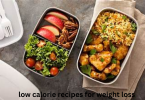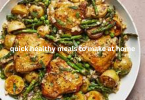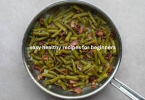Maintaining a balanced diet is one of the most important aspects of leading a healthy lifestyle. The phrase “healthy food recipes for daily diet” is more than just a trend—it’s a lifestyle choice that helps improve your overall well-being, maintain energy levels, and support long-term health. However, many people associate healthy eating with bland or complicated meals, which often discourages consistency.
In reality, healthy eating can be simple, delicious, and practical when you follow the right recipes. In this article, we’ll discuss the importance of including healthy food recipes in your daily diet, explore easy meal ideas for breakfast, lunch, dinner, and snacks, and examine the benefits and potential drawbacks of maintaining such a routine.
Why Healthy Food Recipes Are Important for a Daily Diet

Eating nutritious food daily provides your body with the essential nutrients it needs to function effectively. A healthy daily diet ensures that you consume the right amount of carbohydrates, proteins, fats, vitamins, and minerals. It helps maintain body weight, boosts immunity, and enhances mental focus.
Here are some key reasons why healthy food recipes should be part of your daily routine:
- Consistent Energy Levels: Whole grains, fruits, and lean proteins release energy slowly throughout the day, preventing fatigue and mid-day slumps.
- Improved Digestion: Fiber-rich foods such as vegetables, legumes, and oats help regulate digestion and prevent constipation.
- Better Weight Management: Healthy meals are usually lower in calories but higher in nutrients, which helps control appetite naturally.
- Reduced Risk of Chronic Diseases: A balanced diet lowers the risk of heart disease, diabetes, and certain types of cancer.
- Mental Clarity: Nutrient-dense foods enhance brain function and concentration, helping you stay productive and alert.
Healthy Food Recipes for Daily Diet
1. Breakfast: Overnight Oats with Fruits
Ingredients:
- ½ cup rolled oats
- 1 cup low-fat or plant-based milk (almond, oat, or soy milk)
- 1 tablespoon chia seeds
- 1 tablespoon honey or maple syrup
- Fresh fruits (banana slices, strawberries, or blueberries)
Preparation:
- Combine oats, chia seeds, and milk in a jar or bowl.
- Stir in honey or maple syrup for natural sweetness.
- Refrigerate overnight.
- In the morning, top it with fresh fruits and serve chilled.
Nutritional Benefits:
- High in dietary fiber which supports digestion.
- Contains antioxidants from fruits that protect against cellular damage.
- Provides long-lasting energy due to complex carbohydrates.
Tip: For extra protein, add a spoonful of Greek yogurt or a few crushed nuts on top.
2. Lunch: Grilled Chicken and Avocado Salad
Ingredients:
- 1 grilled chicken breast (or tofu for a vegetarian option)
- 2 cups mixed greens (spinach, lettuce, kale)
- ½ avocado, sliced
- 1 tablespoon olive oil
- Lemon juice, salt, and pepper to taste
Preparation:
- In a large bowl, toss the mixed greens and avocado.
- Slice the grilled chicken and place it over the salad.
- Drizzle olive oil and lemon juice on top.
- Season with salt and pepper before serving.
Nutritional Benefits:
- Excellent source of lean protein, which helps repair and build tissues.
- Healthy fats from avocado and olive oil support heart health.
- Rich in vitamins A, C, and K for immune function and bone strength.
Tip: Add some quinoa or chickpeas for additional fiber and minerals.
3. Dinner: Vegetable Stir-Fry with Brown Rice
Ingredients:
- 1 cup mixed vegetables (broccoli, carrots, bell peppers, snow peas)
- ½ cup cooked brown rice
- 1 tablespoon olive or sesame oil
- 1 teaspoon low-sodium soy sauce
- 1 clove garlic (minced)
- 1 teaspoon grated ginger
Preparation:
- Heat oil in a non-stick pan.
- Add garlic and ginger, sauté for 30 seconds.
- Add vegetables and stir-fry for 5–7 minutes until slightly tender but crisp.
- Add soy sauce and toss evenly.
- Serve hot with cooked brown rice.
Nutritional Benefits:
- High in vitamins, minerals, and antioxidants.
- Provides dietary fiber which supports digestive health.
- Low in unhealthy fats and calories, making it ideal for dinner.
Tip: You can substitute brown rice with quinoa or millet for more variety.
4. Healthy Snacks: Smart Choices Between Meals
Snacking can either make or break your diet. Instead of reaching for processed foods, try these wholesome snack ideas.
a. Greek Yogurt Parfait
- Layer Greek yogurt with granola and fresh fruits.
- Add a drizzle of honey for natural sweetness.
b. Mixed Nuts and Seeds
- A handful of almonds, walnuts, or sunflower seeds offer protein and good fats.
c. Fresh Vegetables with Hummus
- Carrot, celery, or cucumber sticks with hummus make a satisfying, low-calorie snack.
Nutritional Benefits:
- Keeps hunger under control between meals.
- Supports muscle recovery and energy levels.
- Prevents overeating during main meals.
You may also like to read these posts:
Easy Healthy Recipes for Beginners: A Complete Guide to Simple, Nutritious Cooking
Quick Healthy Meals to Make at Home: A Complete Guide to Eating Well Without the Stress
Low Calorie Recipes for Weight Loss: Eat Smart, Feel Great, and Stay Full
Nutritious Breakfast and Dinner Ideas: A Complete Guide to Eating Healthy Every Day
Benefits of Following Healthy Food Recipes for Daily Diet

- Supports Weight Management:
Balanced meals prevent overeating and promote healthy weight loss or maintenance. - Enhances Heart Health:
Foods rich in omega-3 fatty acids, fiber, and antioxidants reduce cholesterol and support cardiovascular function. - Boosts Immunity:
Regular intake of fruits, vegetables, and whole grains strengthens the immune system. - Improves Skin and Hair:
Vitamins and minerals from whole foods promote healthy skin and hair growth. - Increases Productivity and Focus:
A nutrient-dense diet enhances brain performance and concentration. - Promotes Longevity:
Consistent healthy eating reduces the risk of lifestyle-related diseases and supports long-term wellness.
Drawbacks or Challenges of Maintaining a Healthy Daily Diet
While a healthy food diet has numerous benefits, it also comes with certain challenges:
- Time and Preparation:
Preparing fresh meals daily can be time-consuming for people with busy schedules. Meal planning can help overcome this issue. - Higher Cost of Fresh Produce:
Fresh and organic foods can sometimes be more expensive than processed alternatives. Buying seasonal and local produce can reduce costs. - Adjustment Period:
Transitioning from processed foods to whole foods may take time. Your taste buds and digestive system might need a short adjustment phase. - Social and Lifestyle Constraints:
Eating out or attending social events may make it harder to follow your diet strictly. Planning ahead or choosing healthier menu options can help. - Potential Nutrient Gaps:
Poorly planned diets (especially vegetarian or vegan ones) can lead to deficiencies in vitamins like B12 or minerals like iron if not balanced properly.
Tips to Stay Consistent with a Healthy Daily Diet
- Plan your meals in advance to save time and avoid unhealthy choices.
- Stay hydrated throughout the day.
- Practice portion control even with healthy foods.
- Experiment with flavors—use herbs and spices instead of processed sauces.
- Be flexible—occasional indulgence is fine as long as you return to your routine.
Conclusion
Adopting healthy food recipes for daily diet is one of the most rewarding lifestyle changes you can make. It nourishes your body, sharpens your mind, and helps you maintain long-term health. While there may be a few challenges in terms of time and convenience, the benefits far outweigh the drawbacks.
The key is to start small—choose one or two recipes, prepare them consistently, and gradually build a routine that works for you. Healthy eating doesn’t mean giving up taste or satisfaction; it’s about choosing balance, freshness, and variety.
By integrating these healthy food recipes into your daily diet, you take an active step toward a happier, more energetic, and healthier life.
FAQs
1. What are the best healthy food recipes for daily diet?
The best recipes are balanced, nutrient-rich, and easy to prepare. Examples include overnight oats for breakfast, grilled chicken or tofu salads for lunch, vegetable stir-fry with brown rice for dinner, and snacks like Greek yogurt parfaits or mixed nuts. The key is variety and using whole, unprocessed ingredients.
2. Can I follow a healthy daily diet if I’m vegetarian or vegan?
Yes, absolutely! Focus on plant-based protein sources like beans, lentils, tofu, tempeh, nuts, seeds, and whole grains. Incorporate a variety of fruits, vegetables, and healthy fats to meet your nutrient needs. Vitamin B12 and iron supplementation may be necessary for strict vegans.
3. How long does it take to prepare healthy meals daily?
It depends on the recipe. Simple meals like overnight oats or salads can take 5–15 minutes. More elaborate dishes like stir-fries or grain bowls may take 20–30 minutes. Meal prepping in advance can save time and ensure you stick to your healthy daily diet.
4. Are healthy food recipes expensive?
They can be slightly more expensive than processed foods, especially if you buy organic produce. However, buying seasonal fruits and vegetables, planning meals, and preparing food at home can significantly reduce costs.
They can be slightly more expensive than processed foods, especially if you buy organic produce. However, buying seasonal fruits and vegetables, planning meals, and preparing food at home can significantly reduce costs.
5. Will eating healthy food help me lose weight?
Healthy food recipes are generally lower in calories and higher in nutrients than processed foods, which helps manage hunger and promotes weight control. However, portion sizes and overall calorie intake still matter for weight loss.




